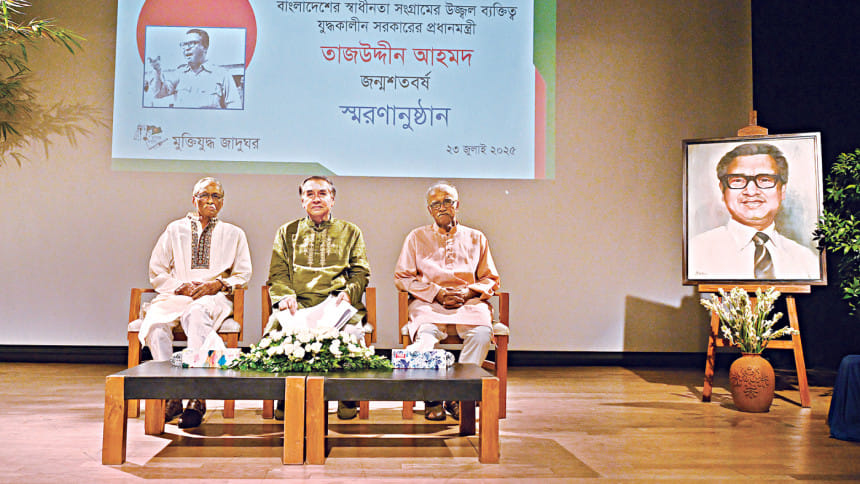Tajuddin’s leadership lit the path to liberation

Despite the total uncertainty, Tajuddin made a resolute decision that armed struggle was the path we must take -- for our country, for the liberation of our people.
Tajuddin Ahmad, the founding Prime Minister of Bangladesh, is a towering political figure whose unwavering patriotism, strategic acumen, crisis management skills, and leadership in the country's Liberation War deserve thorough study, said speakers yesterday marking the birth centenary of the great leader.
He led the Liberation War-time government-in-exile and his leadership, marked by integrity and foresight, laid the foundation for the country's victory against the Pakistani army and ensured the birth of sovereign Bangladesh amidst numerous challenges, they said while speaking at a commemorative programme.
The programme was arranged by the Liberation War Museum at their auditorium.
Yet, despite his pivotal role, Tajuddin Ahmad's contributions remain largely unrecognised in mainstream narratives. Bangladesh must strive for a more accurate and inclusive historical account, they added.
Liberation War Museum trustee Mofidul Hoque said the way Tajuddin led the Mujibnagar government during nine months of the Liberation War is the finest hour of the country's history and Tajuddin played the pivotal role in creating that finest hour.
Terming Tajuddin as a highly organised leader, he said, "History entrusted him with a great responsibility, and he fulfilled it in an extraordinary way. There's so much we can learn from this, and his life should be studied."
Sarwar Ali, another trustee of the museum, said Tajuddin's role in all three phases of Bangladesh's struggle for independence -- the preparatory phase, the phase of armed war, and the post-victory phase -- was profoundly significant.
"Without fully recognising and documenting Tajuddin's contribution, the history of Bangladesh's independence struggle cannot be complete," he said.
Delivering the keynote speech, The Daily Star Editor and Publisher Mahfuz Anam said Tajuddin was a truly great personality -- his patriotism, dedication, honesty, self-sacrifice, political acumen, strategy and morality all together made him a genuinely unique individual.
He said the lack of recognition for Tajuddin on a national level reflects a collective intellectual bankruptcy. "I'm not pointing at any particular party, government, or individual -- but rather speaking in a broader sense. Both personally and institutionally, we suffer from a kind of intellectual bankruptcy, as well as intellectual timidity," he said.
He said the closeness between Tajuddin and Bangabandhu Sheikh Mujibur Rahman, built on mutual respect and trust, grew during the anti-Ayub Khan movement and the struggle for emancipation in the 1960s.
The relationship between Tajuddin and Bangabandhu was almost like two sides of the same coin. Bangabandhu had the charisma -- the ability to inspire and motivate the nation, while Tajuddin had the organisational skills, establishing discipline and grassroots leadership.
Shedding light on the courage and integrity of Tajuddin, Mahfuz Anam said when Tajuddin left Dhaka after the night of March 25 -- when Pakistan began the genocide -- he was heading into an unknown future. Yet, he was deeply contemplating how the movement would unfold, where to go, what to do, and how to organise an armed struggle.
"Despite the total uncertainty, Tajuddin made a resolute decision that armed struggle was the path we must take -- for our country, for the liberation of our people," he said.
When he reached the Indian border, Tajuddin identified himself and those with him not as refugees seeking help but as representatives of an independent nation fighting for its liberation.
"This wasn't a plea for aid from desperation but a declaration of intent from leadership. To me, this mindset is incredibly important. I find this deeply significant," Mahfuz Anam said.
When Tajuddin met the then Indian Prime Minister Indira Gandhi for the first time, he spoke with dignity and expressed that Bangladesh wished to fight its own war. He only requested assistance with training freedom fighters and providing arms and ammunition -- but emphasised the war would be fought by us. "This was an extraordinary move," said Mahfuz.
He said Tajuddin demonstrated his political acumen and strategic depth when Awami League leaders in India were divided over the formation of the government.
The youth group favoured a revolutionary government, while the veteran leaders supported the establishment of a government composed of elected representatives. Forming a government with elected representatives was far more acceptable internationally, as it created the scope to declare that the government was formed by the people's representatives.
Tajuddin successfully mediated differences of opinion between Commander-in-Chief MAG Osmani and the sector commanders of the Liberation War.
According to Mahfuz Anam, another of Tajuddin's accomplishments was his ability to convince Indian leadership -- both political and military -- that the leaders of Bangladesh were sincere, dedicated, and had no agenda other than securing the freedom of the country.
One role of Tajuddin that Mahfuz, himself a freedom fighter, deeply admires and salutes was his ability to inspire the freedom fighters as he endlessly visited the Mukti Bahini camps.
Tajuddin lived a simple life and maintained transparency in all his work. Whenever foreigners wished to meet him, he ensured that meetings took place in a liberated zone of Bangladesh. This created a powerful impression that those areas were under the effective control of the Bangladeshi government.
"I sincerely urge everyone to read Tajuddin's life, learn about his contributions, and come to understand what an extraordinary politician and leader he truly was," Mahfuz Anam urged.
The programme featured a moving musical tribute by Tanya Mannan. Mohiuddin Shamim read from the late leader's diary, while Syed Shahidul Islam Naju read his letters.
Adding a literary dimension to the tribute, Shirin Islam read from the novel Shakkhi Chhilo Shirostran, written about Tajuddin Ahmad's life, while Mahidul Islam recited a poem on the great leader.

 For all latest news, follow The Daily Star's Google News channel.
For all latest news, follow The Daily Star's Google News channel. 



Comments